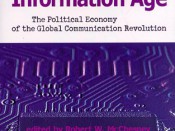“Empire of Barbarism,” coauthored with Brett Clark (Foster listed first), Monthly Review vol. 56, no. 7 (December 2004), pp. 1-15. DOI: 10.14452/MR-056-07-2004-11_1
“A new age of barbarism is upon us.” These were the opening words of an editorial in the September 20, 2004, issue of Business Week clearly designed to stoke the flames of anti-terrorist hysteria. Pointing to the murder of schoolchildren in Russia, women and children killed on buses in Israel, the beheading of American, Turkish, and Nepalese workers in Iraq, and the killing of hundreds on a Spanish commuter train and hundreds more in Bali, Business Week declared: “America, Europe, Israel, Egypt, Pakistan, and governments everywhere are under attack by Islamic extremists. These terrorists have but one demand—the destruction of modern secular society.” Western civilization was portrayed as standing in opposition to the barbarians, who desire to destroy what is assumed to be the pinnacle of social evolution.
Translations:
- Original published version appeared in Portuguese translation in Commnicações, vol. 1, Civilização ou Barbárie (Serpa, Portugal: Encontro Internacional, September 2004), pp. 46-53.
- German translation in Utopiekreativ: Diskussion Sozialistischer Alternativen, June 2005, vol. 176, 491-503;
- Spanish translation in Marx Ahora (Cuba), no. 19 (2005), 7-19.
- Polish translation in Rewolucja, no. 4, 2006.
- Translated in Monthly Review, Turkish edition, no. 9 (Istanbul: Kalkedon, 2006).
- Japanese translation, February 1, 2005, at http://www.ne.jp/asahi/institute/association/old/newsletter/20050201/article_2.htm.

